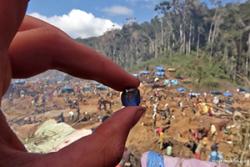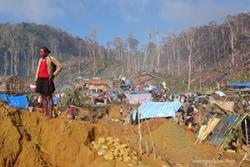A 'sapphire rush' has sent at least 45,000 miners into Madagascar's protected rainforests
![]() This article by Julia P G Jones, Professor of Conservation Science, Bangor University was originally published on The Conversation. Read the original article.
This article by Julia P G Jones, Professor of Conservation Science, Bangor University was originally published on The Conversation. Read the original article.
 A blue sapphire found at the ‘rush’ site in October 2016.: Image Credit Rosey Perkins roseyperkins.comThe rainforests of Didy in eastern Madagascar usually ring with the calls of the indri, the island’s largest lemur. There is a different noise now: the chopping of trees, digging of gravel, and cheers of encouragement from the thousands of illegal miners who have flooded to these forests since sapphires were discovered in late September.
A blue sapphire found at the ‘rush’ site in October 2016.: Image Credit Rosey Perkins roseyperkins.comThe rainforests of Didy in eastern Madagascar usually ring with the calls of the indri, the island’s largest lemur. There is a different noise now: the chopping of trees, digging of gravel, and cheers of encouragement from the thousands of illegal miners who have flooded to these forests since sapphires were discovered in late September.
Bemainty, an area in the west of Didy, is experiencing a sapphire rush. Rosey Perkins, a gemologist, visited soon after the rush began in October. She estimated 45,000 people were already involved and that the mine was growing by 1,500 to 2,000 people a day. By now it may be significantly bigger. She told me:
"These gem deposits are found in the gravels of ancient river beds. Some are unusually large and have an attractive blue colour; there have been some phenomenal finds which are drawing in traders from as far away as Sri Lanka."
Madagascar is one of the poorest countries in the world. People are desperate for any new income sources and will understandably travel to wherever they see an opportunity. The discovery of precious stones has led to rapid development in a number of parts of the country.
 The Sapphire Rush Near Ambatondrazaka, Madagascar: image courtesy Rosey perkins roseyperkins.comParticular challenges are raised when the stones are discovered in areas of importance for conservation, as with the latest find which is in a protected area: the Corridor Ankeniheny Zahamena (or CAZ). Herintsitohaina Razakamanarivo, a professor of forestry and soil sciences at the University of Antananarivo, said:
The Sapphire Rush Near Ambatondrazaka, Madagascar: image courtesy Rosey perkins roseyperkins.comParticular challenges are raised when the stones are discovered in areas of importance for conservation, as with the latest find which is in a protected area: the Corridor Ankeniheny Zahamena (or CAZ). Herintsitohaina Razakamanarivo, a professor of forestry and soil sciences at the University of Antananarivo, said:
"These forests really matter for their world famous biodiversity, for their contribution to avoiding climate change and of course they also contribute to local livelihoods and are culturally important."
The mining involves removing the trees so that the gem-rich gravels can be dug up and sieved to find the precious stones. There are also concerns that the miners will increase bushmeat harvesting, which is already a growing threat to lemurs and other wildlife in much of Madagascar.
However, the impact of a sudden influx of thousands of people is not simply a conservation issue. This is an example of how the agenda of conservationists and those of local people could be aligned.
I spoke to Tokihenintsoa Andrianjohaninarivo from Conservation International Madagascar, the NGO responsible for managing the protected area. She explained how previous sapphire rushes caused local people who live in these forests to suffer:
"Insecurity increases, the cost of living rises, and the education of a generation of kids may be damaged as schools close. Water becomes polluted as there are suddenly thousands of new people living in an area with no sanitation facilities."
As the latest mine continues to grow, conditions appear to be getting worse. I have spoken to a friend from the area who does not want to be named, but who tells me of deaths from disease and violent conflict. There are also reports of rapes, including a shocking case which allegedly resulted in a girl’s death. (It should be noted that these claims are anecdotal and haven’t been verified.)
Artisanal mining in Madagascar is a significant industry and the country may be one of the largest producers of precious stones in the world. The vast majority of the trade is illegal, however, with no tax paid on the exports.
There have been repeated calls to bring this profitable business out of the shadows so it can contribute to national development. Many people from the region are seeing the benefits though – the mayor of Didy has been on local television to argue in favour of the mining. And rumours persist that powerful individuals profit from the illicit nature of the trade.
Andrianjohaninarivo told me that the conservation managers of the site had a meeting with key officials from the government in November and that an action plan has been made. Professor Razakamanarivo emphasises the urgency of a response: “Much of the harm already caused by this sudden sapphire rush may well be irreversible. The miners need to leave the forest before more damage is done.”
The rush going on right now in Bemainty is only the last of a series which have occurred in protected areas in Madagascar in recent years. In 2012, thousands of miners invaded another part of the Didy forest but were eventually moved on by government agents. In 2015, a similar rush occurred in Zahamena National Park, slightly to the north.
Shiny stones have been buried under Madagascar’s incredible rainforests for millions of years. Miners and traders seeking to capitalise on the value of these gems are placing enormous pressure on the island’s landscape and wildlife, and it remains to be seen whether these areas can be protected in the longer term.
As a conservation scientist I am hugely concerned about the threat to the forest from this sapphire rush. But the most urgent need right now is to bring the area under control, before more people die.
![]()
Publication date: 21 November 2016
